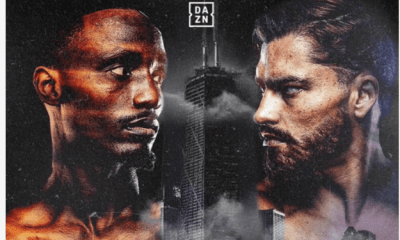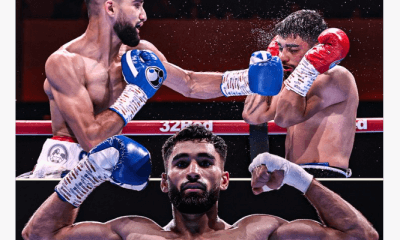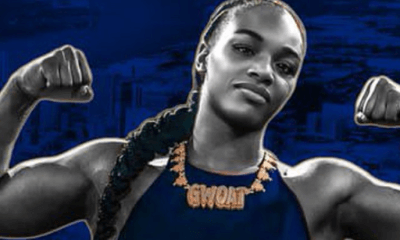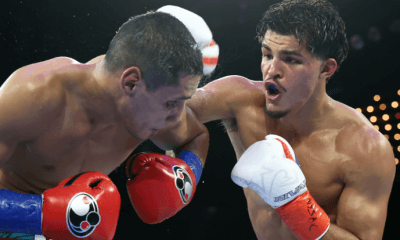Featured Articles
A Cut Eye Not Nearly Enough to Deter Marine Veteran Jamel Herring
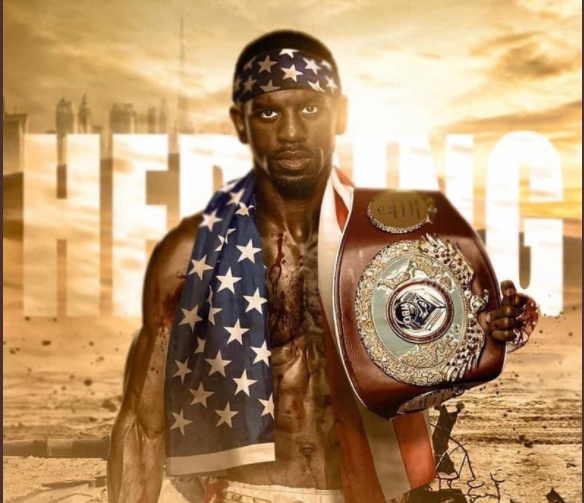
The cut was in a troublesome spot, in Jamel Herring’s right eyelid, an area that had been bloodied before, in his most recent fight seven months earlier, against Jonathan Oquendo. Jamel Herring did win that fight, via eighth-round disqualification, as referee Tony Weeks had previously determined that the cut had been opened in the fifth round by an illegal head-butt. But Herring, who was well ahead on all three official scorecards and thus came away with a unanimous-decision victory, did not look as sharp as he might have preferred. Now here he was again, nicked up but clearly winning another fight, against two-division former world champion Carl “The Jackal” Frampton, who had to realize that his best chance at victory – maybe his only chance – was to target the area that was dripping crimson into Herring’s field of vision. The difference is that, this time, the cut had been opened by a punch in the fourth round, not a butt. Had Herring not been able to continue before the conclusion of the 12 scheduled rounds, he might have come away with a dispiriting TKO loss, regardless of what the scorecards might indicate.
There are more than a few fighters who have become overly cautious, to their detriment, when cut, especially if the blood flow limited what they could see of a suddenly emboldened opponent. Other fighters similarly affected went the other route, abandoning a sound tactical strategy to go all-in for the knockout, the better to eliminate any possibility of losing via stoppage due to a worsening cut. But Jamel Herring, a Marine Corps veteran of two tours of duty in war-torn Iraq, has seen blood before. Lots and lots of blood in places far more dangerous than the ring. He continued to do what he had been doing so capably since the opening bell, fully utilizing his advantages of five inches in height and seven inches in reach, flooring Frampton twice, in the fifth and the sixth rounds, the second knockdown leaving the clearly buzzed challenger reeling, so much so that his trainer, Jamie Moore, threw in the towel, prompting Italian referee Giustino Di Giovanni to wave things off at the 1:40 mark of the sixth of the ESPN+-televised bout from the Caesars Palace Dubai.
“It was just an emotional roller-coaster just to get here,” the 35-year-old Herring (23-2, 11 KOs) said after he had retained his WBC super featherweight title in impressive fashion. “My last outing wasn’t my best. People doubted me. They called me every name in the book. But even with the cut I wasn’t going to give up. I wasn’t going to quit.”
The disappointing outcome for Frampton, 34, who was attempting to become the first Irishman (he is from Belfast, Northern Ireland) to win world championships in three weight classes, also represented something of an emotional roller-coaster, except that his thrill ride had come to an end. The Boxing Writers Association of America’s 2016 Fighter of the Year, he announced his immediate retirement to spend more time with “my beautiful wife and kids,” in addition to complimenting the man who had just conquered him.
“I said before I would retire if I lost this fight, and that’s exactly what I’m going to do,” Frampton announced with the class and dignity he has always demonstrated throughout his commendable career. “I just got beat by the better man. I really struggled to get inside him. He was sharp, shooting from a distance. A perfect game plan. I just got beat. Zero excuses. I had an amazing camp. I came into this fight to win it.”
So did Herring, who had to patiently mark time through two postponements, both owing to his testing positive for COVID-19. But they say all good things come to those who wait, some having nothing to do with his current occupation.
“Some of the criticism of Jamel Herring going into the fight was warranted,” offered two-division former world champ Andre Ward, one of the commentators for the ESPN+ telecast. “You’re only as good as your last performance, and his last performance against Jonathan Oquendo was not great. He didn’t respond the right way. But that didn’t mean he couldn’t respond the right way tonight. He did, and he deserves everything that’s coming his way.”
What could be coming next for Herring is a unification showdown with Mexico’s Oscar Valdez (29-0, 23 KOs), the WBC and lineal super featherweight ruler. It might be a move up to lightweight, which seems reasonable for someone of his elongated physical dimensions (5’10”, 72-inch reach) for a 130-pounder. But whatever awaits him, it has to be less harrowing than the path he already has followed to get to this point in a life marked by exhilarating highs and plunging lows.
Did Frampton say something about how Herring was “shooting from a distance”? How ironic that remark is, considering his two deployments to Iraq. Herring has seen fellow Marines killed or seriously wounded. He knows what it’s like to have RPGs (rocket-propelled grenades) whiz over his head, to cringe when an IED (improvised explosive device) blew up the Humvee just ahead of the one in which he was the gunner, an exposed position that left him especially vulnerable to snipers with high-powered rifles that could cut him down from hundreds of yards away.
To have lived through that and twice to have come home whole, at least physically, reflects no small amount of good fortune. But that is not to say that Herring was not damaged in ways that are not readily discernible. He is the father of six children, one of whom, daughter Ariyanah, was only two months old when she died unexpectedly and without warning of Sudden Infant Death Syndrome. Her loss left a hole in her father’s heart that has yet to fully heal.
There are other unseen wounds to veterans of armed conflicts that never appear on X-rays or medical charts.
“Sniper fire. That was my biggest fear,” Herring said in a 2016 interview with ESPN’s Mark Kriegel. “Whenever we got stopped, I felt like I was a sitting duck, ’cause I’m on top of the Humvee.
“It’s rough over there. You’re deployed for seven, eight months out in the desert and it’s a different world where people are trying to kill you. You have to be watchful at all times.”
Back home and presumably safe, Herring – who had been the team captain of the USA Boxing Team at the 2012 London Olympics – had to cope with the death of his baby daughter and PTSD (Post-Traumatic Stress Disorder). He began to drink heavily, and even now feels the need to sit in restaurants with his back to a wall with a view of all entrances. Some might call that a form of paranoia, but it is what it is. But, fortunately, Herring’s strong and controlled performance against Frampton offers proof, and hope, that the worst is increasingly behind him.
The story of Jamel Herring could easily be adapted into a feature-length or made-for-TV movie, but then isn’t that the case with so many fighters who dealt with issues that supersede anything they may have encountered inside the ropes? Boxing has always provided Hollywood with rich veins of material to be mined, from Jim Corbett to James J. Braddock to Rocky Graziano to Micky Ward to Muhammad Ali. Maybe the tale of Jamel Herring can be put into the future bin of inspirational scripts along with those of Matthew Saad Muhammad, Bernard Hopkins and Arturo Gatti, a select group of life underdogs who rose above their circumstances to achieve a form of glory reserved for those with enough gumption to defy the odds.
Check out more boxing news on video at the Boxing Channel
To comment on this story in the Fight Forum CLICK HERE
-

 Featured Articles3 weeks ago
Featured Articles3 weeks agoResults and Recaps from New York Where Taylor Edged Serrano Once Again
-

 Featured Articles6 days ago
Featured Articles6 days agoThe Hauser Report: Zayas-Garcia, Pacquiao, Usyk, and the NYSAC
-

 Featured Articles3 weeks ago
Featured Articles3 weeks agoResults and Recaps from NYC where Hamzah Sheeraz was Spectacular
-

 Featured Articles4 weeks ago
Featured Articles4 weeks agoFrom a Sympathetic Figure to a Pariah: The Travails of Julio Cesar Chavez Jr
-

 Featured Articles2 weeks ago
Featured Articles2 weeks agoManny Pacquiao and Mario Barrios Fight to a Draw; Fundora stops Tim Tszyu
-

 Featured Articles3 weeks ago
Featured Articles3 weeks agoPhiladelphia Welterweight Gil Turner, a Phenom, Now Rests in an Unmarked Grave
-

 Featured Articles2 weeks ago
Featured Articles2 weeks agoArne’s Almanac: Pacquiao-Barrios Redux
-

 Featured Articles4 weeks ago
Featured Articles4 weeks agoCatterall vs Eubank Ends Prematurely; Catterall Wins a Technical Decision


